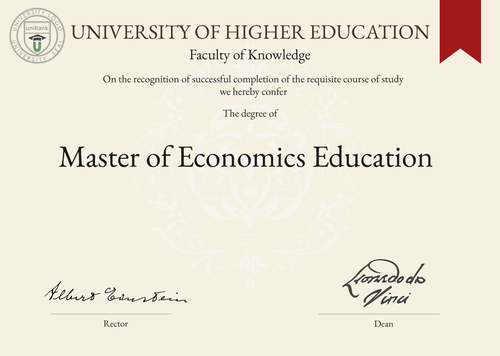
Master of Economics Education (MEE)
Guide to Master of Economics Education Program/Course/Degree
Master of Economics Education (MEE)

Program Name:
Master of Economics EducationProgram or Degree abbreviation:
MEEDuration range:
The duration of the Master of Economics Education program can vary depending on the country or university. Typically, it ranges from 1 to 2 years.Tuition range:
The tuition fees for the Master of Economics Education program can vary based on the country or university. The range can vary from affordable to expensive, depending on the location and reputation of the institution.Overview:
The Master of Economics Education program is designed to provide students with advanced knowledge and skills in economics education. It aims to equip graduates with the necessary expertise to teach economics at various educational levels, including high schools and colleges. The program focuses on both theoretical and practical aspects of economics education, preparing students to become effective educators in the field.Curriculum Overview by year:
The curriculum of the Master of Economics Education program is structured to cover a wide range of topics related to economics and education. The specific courses offered may vary depending on the university, but typically include subjects such as microeconomics, macroeconomics, econometrics, educational psychology, curriculum development and teaching methodologies.Key Components:
The key components of the Master of Economics Education program include a strong foundation in economics principles, specialized knowledge in economics education, practical teaching experience and research skills development. Students are encouraged to engage in internships or teaching practicums to gain hands-on experience in the classroom.Career Prospects:
Graduates of the Master of Economics Education program can pursue various career paths. They can work as economics teachers in high schools or colleges, curriculum developers, educational consultants, or researchers in the field of economics education. The program equips students with the necessary skills to excel in these roles and contribute to the improvement of economics education.Salary Expectations:
The salary expectations for graduates of the Master of Economics Education program can vary depending on factors such as the country, educational level and experience. Generally, economics educators can earn competitive salaries, especially at higher education levels. For a more accurate understanding of salary expectations, you can utilize the Job Sites Search Engine, from our sister site jobRank, which searches over 4,600 job sites worldwide. Make sure to specify not only the job title but also the country you are interested in.Conclusions:
It is important to note that the duration, tuition fees, curriculum, key components, career prospects and salary expectations of the Master of Economics Education program can vary depending on the chosen country or location of study, as well as the university. Prospective students are advised to research and compare different programs and institutions to find the best fit for their academic and career goals. Visitors can search for where this specific degree, Master of Economics Education, is offered anywhere in the world through the uniRank World Universities Search Engine, which provides comprehensive information on universities worldwide.World Universities Search Engine
search for Master of Economics Education (MEE) and add the Location (country, state etc.) or specific University you are interested in studying at.
Query examples:
- Master of Economics Education (MEE) United States
- Master of Economics Education (MEE) United Kingdom online
- Master of Economics Education (MEE) Australia international students
- Master of Economics Education (MEE) University of California
- Master of Economics Education (MEE) University of London tuition fees
- Master of Economics Education (MEE) University of Sydney scholarships
Share Program/Course
Interesting? Share this program/course/degree info with your friends now.